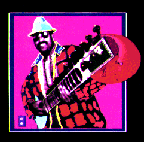
Walk into Batish records on Mission Street and the first thing you will notice are a set of Lounge chairs. "You get stuck in Santa Cruz and you just want to be a beach bum," says owner Ashwin Batish, laughing. That explains the lounge chairs.
But you also notice that the store is small, the music selection is slim, and the atmosphere is relaxed. For Batish, the record store is wholly secondary priority. He is a professional sitar player - perhaps "master" is a better word - and he's is also an example of someone who refuses to get caught up in one thing.
Too many people who are stuck in one style or genre never do anything out of that particular area," says Batish, referring to music styles.
Like many other kids in the fifties and sixties, Batish grew up listening to and singing Elvis Presley, Cliff Richard and Beatles songs. It wasn't until Batish moved to England as a teenager with his family in the mid sixties, that he listened to Ravi Shankar and other masters of Indian sitar and tabla music.
"Until the first three or four years in England, I was always combining things, because I was conscious of the listener, and since my learning of the instrument happened more in England," said Batish, "I would play for these kids, who were familiar with the Beatles, Cliff Richard, and I'd go 'Well, how do you really get their attention," and so doing this serious classical piece, I would sneak in a little bit of (Western music) and everybody would go Ah yeah... that's pretty hot."
But Batish, who has recorded completely classical sitar records in the past, has not always backed the sitar with upbeat western tempos. Batish first experimented with Indo-rock (Western musical variations played through a sitar) when he played the sitar for the kids at his English school and for a larger audience.
Batish's desire to keep an audience's attention is even apparent in his speech. He frequently laughs and jokes, and continually varies his topic of conversation. He is never monotonous.
Yet, Batish claims that his urge to play musical variations on the sitar doesn't stem solely from an attempt to please rock-and-roll fans. Instructed by his father, who introduced much Western music to India through his work on Indian films backed with pop-type soundtracks, Ashwin diligently practiced sitar exercise for hours at a time. They became monotonous and dull, so Ashwin began to slightly vary the exercises, and soon he was creating a unique style. Ashwin belives that this eventual improvisation was his father's unspoken intent Batish's father not only admired Western music but much of western culture; he persuaded Ashwin to pursue a degree in accounting, which Ashwin finally received from San Jose State. Batish admitted that although accounting was painfully dull, without a business sense, he would not have been able to finance his recent album Sitar Power with the profits from his music supply business.
Sitar Power's current mixture possesses an almost raplike beat that places the sitar in an eighties context rather that into traditional sound like the classical sitar music on Batish's past albums. "Those scales that I'm playing [on Sitar Power] come from thousands of years ago. The classical pieces are extremely long. You can't really finish it off in three to five minutes. You have to break it loose," he explains.
Although he enjoys playing classical music as much as Indo-rock, he says he feels that strict adherence to one set of musical rules lacks innovation, Instead of having a tabla playing there, I have a trap set. Instead of having a sitar melody coming through, I have a guitar melody coming through. But if you can play a composition with even two percent of a classical composition, you have a very successful pop composition."
But when asked about musicians like Mick Jagger, who have shifted from rhythm and blues music to eighties-type pop, Batish reserves all judgement. "Anytime an artist goes into different area, there's survival involved in it - there's a reputation involved in it,"Batish says, "Personally, I am the last person to judge because I think whatever I say about any other person is being applied to me. I'm doing the same thing by making this music more approachable, I have delved into the commercial side, and strict traditionalists would say, 'Maybe you shouldn't do that'.
But Batish isn't catering only to the strict traditionalist. And he's not trying to win the worship of all pop music fans. "I don't imagine [Sitar Power] being played on the top 40, "he says. Batish will continue running his record store and playing his sitar. For perhaps most importantly, Batish says he's always believed in "equal modertion."

This site is optimized for Netscape browsers
©1995/1996/1997 Batish Records
email: info [at] batish.com
All rights reserved. Intended For Personal Use Only.